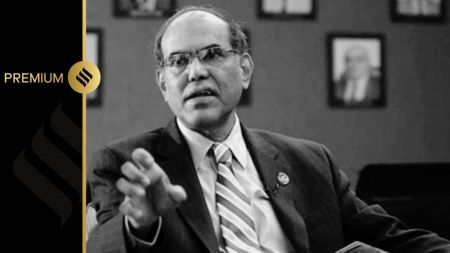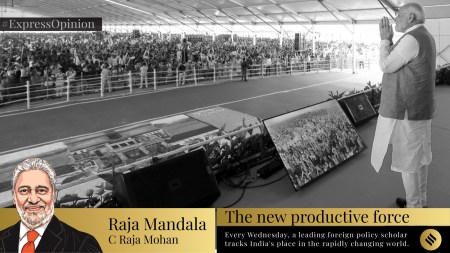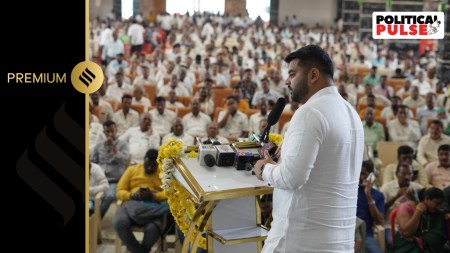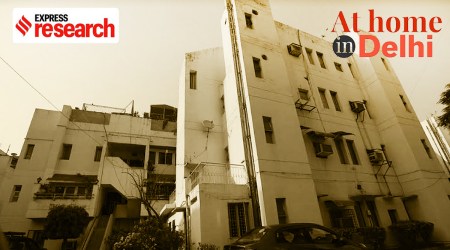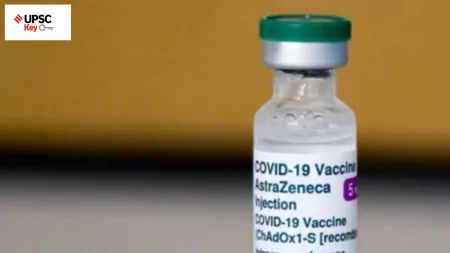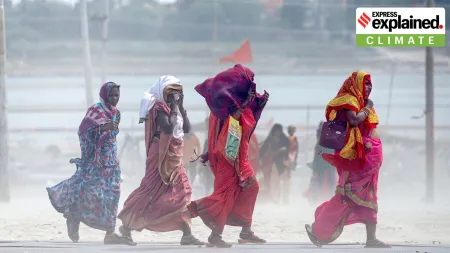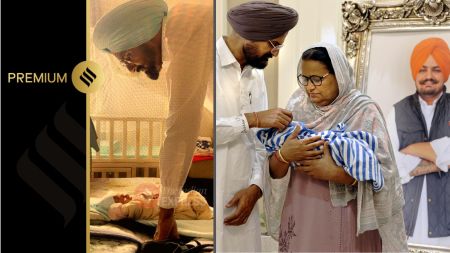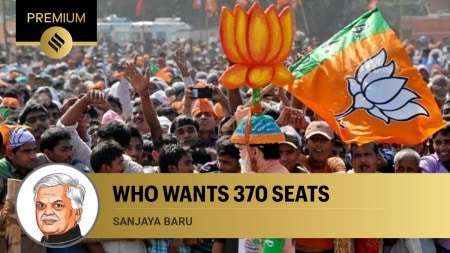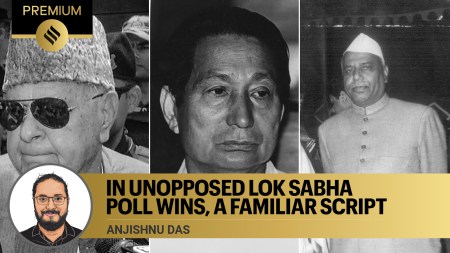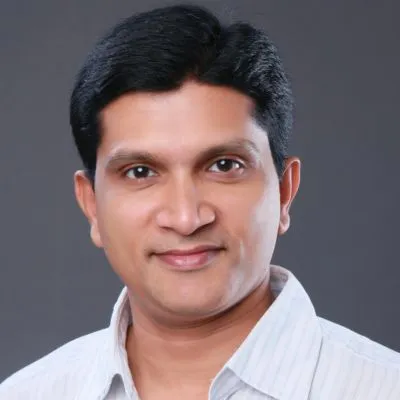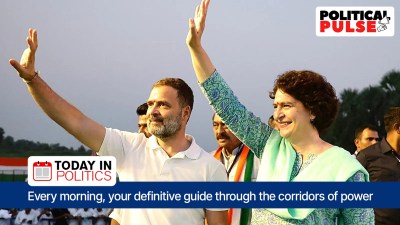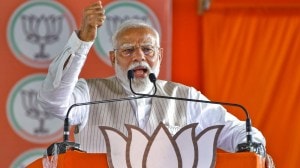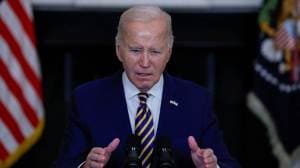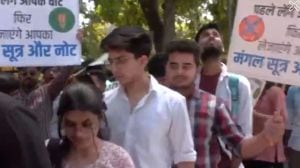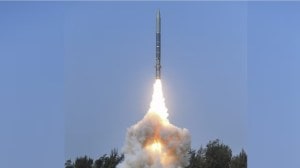- India
- International
SC orders independent probe into Pegasus, says Govt can’t get free pass every time ‘national security’ is raised
The ruling came on a batch of 12 petitions which sought an independent probe into the allegations which surfaced in the media about the unauthorised surveillance.
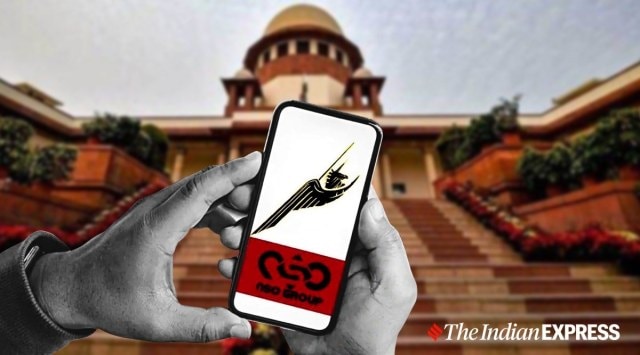 The SC had reserved its order in the case after hearing the different sides on September 13.
The SC had reserved its order in the case after hearing the different sides on September 13.Making clear that the State cannot get “a free pass every time the spectre of ‘national security’ is raised”, the Supreme Court Wednesday ordered a “thorough inquiry” into allegations of unauthorised surveillance using the Pegasus spyware.
The inquiry will be conducted by a three-member technical committee constituted by the court and its functioning will be overseen by Justice R V Raveendran, a retired judge of the Supreme Court, who will be assisted by two other experts.
The committee has been asked to conduct the inquiry and submit its report to the Supreme Court “expeditiously”. The matter will be heard again after eight weeks.
Ruling on a batch of 12 petitions which sought an independent probe into the alleged illegal use of the Israeli NSO Group spyware Pegasus, the bench of Chief Justice of India N V Ramana, Justices Surya Kant and Hima Kohli said “the Petitioners have placed on record certain material that prima facie merits consideration by this Court. There has been no specific denial of any of the facts averred by the Petitioners by the Respondent — Union of India. There has only been an omnibus and vague denial in the ‘limited affidavit’ filed by the Respondent — Union of India, which cannot be sufficient. In such circumstances, we have no option but to accept the prima facie case made out by the Petitioners to examine the allegations made”.
Technical members: 1. Prof Naveen Kumar Chaudhary, Dean, Nat’l Forensic Sciences Univ, Gandhinagar.
2. Dr. Prabaharan P., Prof Amrita Vishwa Vidyapeetham, Kerala.
3. Dr. Ashwin Anil Gumaste, Institute Chair Associate Prof, IIT Bombay@IndianExpress— Ananthakrishnan G (@axidentaljourno) October 27, 2021
While acknowledging that it is “a settled position of law that in matters pertaining to national security, the scope of judicial review is limited”, the bench said “this does not mean that the State gets a free pass every time the spectre of ‘national security’ is raised. National security cannot be the bugbear that the judiciary shies away from, by virtue of its mere mentioning. Although this Court should be circumspect in encroaching upon the domain of national security, no omnibus prohibition can be called for against judicial review… The mere invocation of national security by the State does not render the Court a mute spectator”.
It listed what it called the “compelling circumstances that have weighed with us to pass such an order”:

* Right to privacy and freedom of speech are alleged to be impacted, which needs to be examined.
* The entire citizenry is affected by such allegations due to the potential chilling effect.
* No clear stand taken by the Respondent-Union of India regarding actions taken by it.
* Seriousness accorded to the allegations by foreign countries and involvement of foreign parties.
* Possibility that some foreign authority, agency or private entity is involved in placing citizens of this country under surveillance.
* Allegations that the Union or State Governments are party to the rights’ deprivations of the citizens.
* Limitation under writ jurisdiction to delve into factual aspects. For instance, even the question of usage of the technology on citizens, which is the jurisdictional fact, is disputed and requires further factual examination.
The terms of reference of the committee include:
* Whether the Pegasus suite of spyware was used on phones or other devices of the citizens of India to access stored data, eavesdrop on conversations, intercept information and/or for any other purposes not explicitly stated herein?
* The details of the victims and/or persons affected by such a spyware attack.
* What steps/actions have been taken by the
Respondent-Union of India after reports were published in the year 2019 about hacking of WhatsApp accounts of Indian citizens, using the Pegasus suite of spyware.
* Whether any Pegasus suite of spyware was acquired by the Respondent-Union of India, or any State Government, or any central or state agency for use against the citizens of India?
* If any governmental agency has used the Pegasus suite of spyware on the citizens of this country, under what law, rule, guideline, protocol or lawful procedure was such deployment made?
* If any domestic entity/person has used the spyware on the citizens of this country, then is such a use authorised?
During the hearing, the Centre had filed a brief affidavit “unequivocally” denying the allegations against it and said the matter involved national security questions due to which it did not wish to put the details in a public affidavit and make it a matter of public debate. It said it would divulge the details to a committee of experts who would examine the issue. It urged the court to allow it to set up the committee.
But the bench, in its order, said it is turning down the government’s request to allow it to set up the committee due to allegations that the Union or state governments are party to the rights’ deprivations of the citizens. It said allowing the request “would violate the settled judicial principle against bias, i.e., that ‘justice must not only be done, but also be seen to be done’.”
Noting it was “an extremely uphill task to find and select experts who are free from prejudices, are independent and competent” and that “some of the candidates politely declined this assignment, while others had some conflict of interest”, the bench named a three-member technical committee comprising Dr Naveen Kumar Chaudhary, Dean of National Forensic Sciences University in Gandhinagar; Dr Prabaharan P, Professor at Amrita Vishwa Vidyapeetham in Kerala; and Dr Ashwin Anil Gumaste, Institute Chair Associate Professor at Indian Institute of Technology, Bombay. The committee’s functioning will be overseen by Justice Raveendran who will be assisted by former IPS officer Alok Joshi and cyber security expert Dr Sundeep Oberoi.
The bench expressed displeasure over the “limited affidavit” filed by the government saying it “does not shed any light on their stand or provide any clarity as to the facts of the matter at hand”.
The bench said “if the… Union of India had made their stand clear it would have been a different situation, and the burden on us would have been different. Such a course of action taken by the… Union of India, especially in proceedings of the present nature which touches upon the fundamental rights of the citizens of the country, cannot be accepted”.
The ruling also touched upon the aspect of privacy rights, noting “certain limitations exist” but “any restrictions imposed must necessarily pass constitutional scrutiny”.
The bench said the “right to privacy is directly infringed when there is surveillance or spying done on an individual, either by the State or by any external agency” and “if done by the State, the same must be justified on constitutional grounds”.
Elaborating on the need for balancing privacy concerns with the security needs of the state, the bench said it “is cognizant of the State’s interest to ensure that life and liberty is preserved and must balance the same. For instance, in today’s world, information gathered by intelligence agencies through surveillance is essential for the fight against violence and terror. To access this information, a need may arise to interfere with the right to privacy of an individual, provided it is carried out only when it is absolutely necessary for protecting national security/interest and is proportional. The considerations for usage of such alleged technology, ought to be evidence based. In a democratic country governed by the rule of law, indiscriminate spying on individuals cannot be allowed except with sufficient statutory safeguards, by following the procedure established by law under the Constitution”.
“Somewhat allied to the concerns of privacy,” it said, “is the freedom of the press”. It recalled observations made by the Supreme Court in the case of Indian Express Newspapers (Bombay) Private Limited v. Union of India, (1985) 1 SCC 641: “The freedom of press, as one of the members of the Constituent Assembly said, is one of the items around which the greatest and the bitterest of constitutional struggles have been waged in all countries where liberal constitutions prevail. The said freedom is attained at considerable sacrifice and suffering and ultimately it has come to be incorporated in the various written constitutions…”
It said “it is undeniable that surveillance and the knowledge that one is under the threat of being spied on can affect the way an individual decides to exercise his or her rights. Such a scenario might result in self-censorship. This is of particular concern when it relates to the freedom of the press, which is an important pillar of democracy. Such a chilling effect on the freedom of speech is an assault on the vital public-watchdog role of the press, which may undermine the ability of the press to provide accurate and reliable information”.
“An important and necessary corollary of such a right is to ensure the protection of sources of information. Protection of journalistic sources is one of the basic conditions for the freedom of the press. Without such protection, sources may be deterred from assisting the press in informing the public on matters of public interest,” it said.
May 02: Latest News
- 01
- 02
- 03
- 04
- 05


